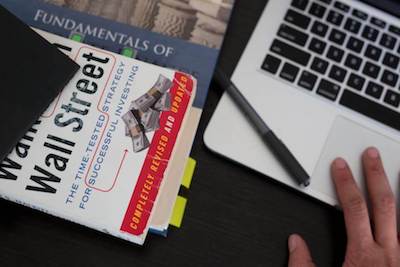The concept of having to save money may have you thinking, “But doesn’t saving money imply that I don’t have enough?”
Well, let me tell you… this is not true! Developing an abundant mindset is about recognizing the wealth and resources that already exist in your environment… all while creating more.
Most importantly, intention matters!
If you cringe around the word “budget”, chances are your intention, or the energy behind it, comes from a space of lack. Saving money because you think you may not have enough tomorrow is different from saving money because you want to invest in your future. This is a simple shift.
When you catch yourself trying to save or avoid spending from a place of lack, switch your thoughts to positive statements like: Saving money brings proof of my abundance, saving money allows for larger investments, and I enjoy saving as much as I spend to invest in my future!

Making small adjustments in your finances goes a long way and it doesn’t have to be intimidating.
Here are 10 simple tips to help you budget and save more money so you feel like a million bucks:
1. Set financial goals: And continuously revisit them! After you calculate your expenses, decide how much you want to save each month, and then set your budget for spending. You can use apps like Mint to track your spending or get free financial counseling from your bank.
2. Emotional Purchases: “This leather jacket is going to change my life” is probably not true. Watch yourself for emotionally-charged words around purchases. This will give you a clue as to whether you are falling for “shiny object syndrome”, or becoming distracted by external things that you think will solve all your problems. When you find yourself emotionally charged, take a step back and allow at least 24 hours before you actually purchase.
3. Do your research: Before you make a purchase, consider whether you will need to replace parts, the shelf life of the item, how long before renewal (if it’s a subscription), and weigh that information against your long-term goals. Do you just need a short-term solution, or is it worth spending more now and saving money later? Being proactive about major purchases can save you hundreds, even thousands of dollars.
4. Pay into your savings first: If possible, automate this action. There are ways to have your check split into separate accounts so that a percentage of your earnings goes straight into your savings. You can check with your employer, or set this up with your bank. If you have your savings on auto-pay, you are less likely to have the temptation to spend it - even if it’s just a small amount to start with. You are more likely to be successful by starting with a short-term goal such as saving $20 a month.

5. Avoid hidden fees and interest costs: Make a monthly habit of spending some time with your bank and bill statements. Review for any charges that can be avoided by setting up certain features with your bank, or meeting certain criteria. Human errors happen! So it always pays to know what’s happening in your bank account.
6. Know when to buy quality products vs. generic: Furniture, major appliances, or a professional wardrobe can all be examples of when to buy quality. If it’s something you won’t use often, or even after first use, seek generic.
7. Manage your paid subscriptions: I recently canceled a paid Google feature that I have never used since purchase! It was something I thought I would need at the time and have been paying monthly for over a year. While auto-pay is a handy feature, we can easily forget about what we’ve signed up for if we’re no longer using it - especially when it’s a small amount.
8. Double up on dinner: I set aside one night a week to cook my meals for the week. Not only am I saving money by not eating out during the week, but I save valuable time and eat healthier meals! If you can’t cook for the whole week, you can do something as simple as make two batches of dinner so that you have your meal for the next day.
9. Be creative: If you’re looking for entertainment, opt for outdoors, find free and local events in your community, indulge in a hobby, or invite someone over to your house instead of going out. For traveling on a budget, check out our savvy blog with tips on how to travel like a jet setter!
10. Save on transportation: If you live in a city or commute into one, one of the biggest costs is transportation - car maintenance, insurance, gas, etc. Consider alternative modes of transportation, like riding your bike or carpooling, at least once or twice a week. You can also set aside a budget just for gas. And when shopping for insurance, look for an agent who can help you with comparison costs.
Now before I let you go, I have some other hacks under my sleeve that will help you achieve your dreams of wealth and abundance!
These hacks will assist you by reprogramming your mind to achieve ANYTHING you’ve set yourself to do, have, or accomplish without drastic sacrifices.
I share it ALL in this online Masterclass. It’s overflowing with incredible mind hacks for peak performance and YES, of course, a free spot has been reserved for you :-)
The Masterclass is called Put Your Success On Auto-Pilot and I’m sure you haven’t seen a personal growth training quite like this before - it goes way deeper, and yet many of the techniques you’ll learn are far easier than what you might be used to.
Spots are free but extremely limited, so claim yours here ASAP.
And if you have any other budget tips that can help the community, please share them below :)








